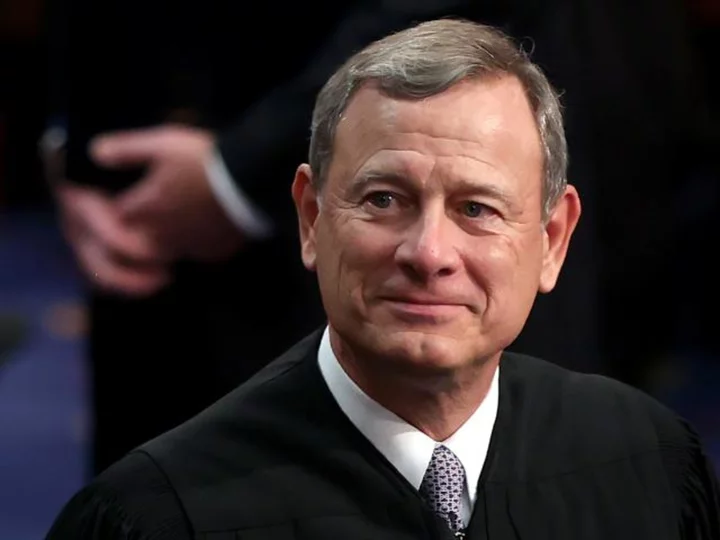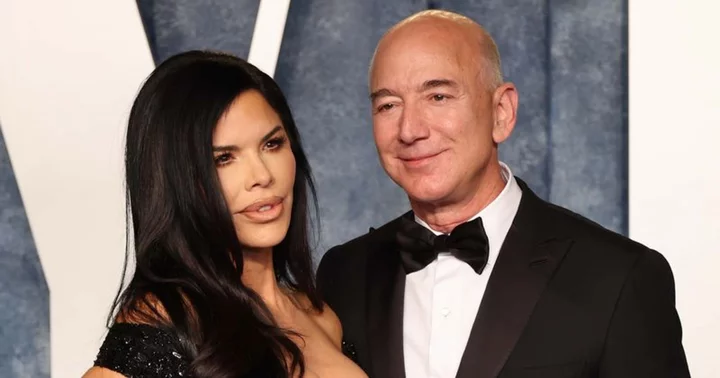Chief Justice John Roberts may not be able to control the Supreme Court's current public image and his colleagues' off-bench behavior. But the tactical Roberts fully defined the court's impact on American law in the session that ended Friday.
The biggest cases? He wrote them, from those covering campus affirmative action, to rules for voting districts, to executive branch power over student-loan relief. And he wrote them in a way that further amassed power for the court itself.
For Roberts personally, however, that wasn't enough.
In a highly unusual move, he took issue on Friday with dissenting colleagues and broader criticism of the court.
"It has become a disturbing feature of some recent opinions to criticize the decisions with which they disagree as going beyond the proper role of the judiciary," he wrote in the 6-3 student-debt relief case. His labored phrasing belied his characteristically lucid prose.
Then, referring to his reasoning that invalidated the White House's plan to help some 40 million borrowers, Roberts said, "We have employed the traditional tools of judicial decisionmaking in doing so. Reasonable minds may disagree with our analysis -- in fact at least three do. We do not mistake this plainly heartfelt disagreement for disparagement. It is important that the public not be misled either. Any such misperception would be harmful to this institution and the country."
Justice Elena Kagan countered with a dissent dripped with ridicule.
The court majority, Kagan declared, "makes itself the decisionmaker on, of all things, federal student-loan policy. And then, perchance, it wonders why it has only compounded the 'sharp debates' in the country?"
Roberts may try to defuse tensions among the nine, but he is inevitably raising them by a series of polarized decisions, largely along ideological 6-3, conservative-liberal lines, and his "nothing to see here" mantra in the face of the court's unpopularity and ethics controversy.
In the aftermath of the Dobbs decision ending constitutional abortion rights, Gallup and other national polls reported that public confidence in the court plunged. More recently, amid debate over the justices' ethics and lack of transparency, a late-May report from Marquette Law School found that only 41% of the country approved of the court's actions.
Roberts' approach to external concerns has been to recast them. He has suggested that public complaints arise simply from disagreement with the outcome of cases rather than doubts about the impartiality or integrity of the justices, who are appointed for life.
"Simply because people disagree with opinions, is not a basis for questioning the legitimacy of the court," he told an audience in Colorado Springs last September.
Embarrassed by Dobbs leak and ethics problems
Roberts is not used to being on the defensive. A first-in-his-class striver from his youth in northern Indiana, through Harvard law school, he earned plum positions in the Ronald Reagan and the George H.W. Bush administrations.
He became a highly respected appellate advocate in both government and private practice, and after a brief tenure on the US Court of Appeals for the DC Circuit, President George W. Bush in 2005 named him to the high court. At 50 years old, he was the youngest chief justice in more than two centuries.
One year ago, there was some question about Roberts' authority with his colleagues on the right wing. In voting to reverse nearly a half century of abortion rights, the five justices to his right had dismissed his arguments to take incremental steps against the constitutional right to end a pregnancy. He lost that battle and the justices by a 5-4 vote fully reversed Roe v. Wade.
The chief justice also failed to get to the bottom of who leaked a preliminary draft of that opinion in Dobbs v. Jackson Women's Health Organization. The eight-month leak investigation itself laid bare how sloppy the justices had been with security, their outdated technology and overall lack of institutional safeguards.
Since the January release of the inconclusive leak report from the court, Roberts has seen public and congressional pressure on a separate front.
The court has no formal ethics code and no way for complaints regarding the justices' off-bench behavior to be aired and resolved. That has been a source of controversy for decades. But recent episodes have put that weakness in sharper focus, and Senate Democrats have vowed action on a Supreme Court ethics bill this month.
Senate Judiciary Committee members have been particularly spurred by ProPublica reports that Justice Clarence Thomas failed to disclose luxury travel and other gifts received from Republican megadonor Harlan Crow. Crow also purchased Thomas' family home in Georgia and paid tuition for Thomas' grandnephew, neither of which was disclosed on the justice's requisite annual financial disclosure forms.
More recently, ProPublica reported that Justice Samuel Alito failed to disclose a 2008 trip he took with hedge fund billionaire Paul Singer, who had business at the court. In an op-ed Alito published in The Wall Street Journal, hours before the ProPublica report went online, he disputed the claims of misconduct.
Roberts declined an invitation to appear before the Senate Judiciary Committee this spring and issued a statement signed by all nine justices affirming their general commitment to ethics principles.
Amassing power for the judiciary
Chief justice, the position Roberts has held for 18 years, is regarded as "the first among equals," and one of the benefits of that rank is the power to assign opinions when he is in the majority. (When he is not, the most senior justice in the majority has that assignment power.) In the recently completed session, Roberts kept the most impactful cases for himself.
His decision rejecting President Joe Biden's attempt to use a 2003 law authorizing the Education Secretary to forgive student loans in national emergencies was based on a rationale that diminishes executive branch power and Congress' authority to set the contours of a law without specific terms for its implementation.
Roberts employed similar reasoning last year as he wrote for the majority opinion curtailing the Environmental Protection Agency's ability to limit emissions from coal-fired power plants under the Clean Air Act. In both, Roberts was joined by Thomas, Alito and the three appointees of former President Donald Trump: Neil Gorsuch, Brett Kavanaugh and Amy Coney Barrett.
As dissenters pointed out then and now, Congress often delegates broadly to agencies because agencies have expertise and can account for changing times and circumstances.
When Kagan dissented to Roberts' ruling in the EPA controversy, she wrote, "The Court appoints itself -- instead of Congress or the expert agency -- the decision-maker on climate policy. I cannot think of many things more frightening."
This time around, she wrote, joined by Justices Sonia Sotomayor and Ketanji Brown Jackson, the Roberts majority did it again by "wielding its judicially manufactured heightened-specificity requirement" on federal student loan policy.
Roberts led majorities to take more modest steps in two cases involving voting rights. One was a surprise, given Roberts' record of trying to limit the protections of the 1965 Voting Rights Act.
Joined by a fellow conservative and the three liberal justices, Roberts wrote an opinion affirming a lower court decision that Alabama violated the VRA. The state legislature had devised a congressional districting plan that included only one Black-majority district among seven districts in a state that has a 27% Black population.
Roberts endorsed existing law that takes account of voters' race in redistricting to ensure that the political process is "equally open" to minority voters and that they have a chance to elect candidates of their choice.
In a separate case, Roberts pulled together a majority to reject a radical theory of independent state legislative power for election rules that has been embraced by Trump's supporters following the 2020 election. In his opinion, Roberts insisted that "state courts retain the authority to apply state constitutional restraints when legislatures" set election rules.
The majority rationale nonetheless ensures federal court oversight of elections as he wrote, "state courts may not so exceed the bounds of ordinary judicial review as to unconstitutionally intrude upon the role specifically reserved to state legislatures."
Those "bounds" will ultimately be determined by Roberts and the Supreme Court.
Achieving long-standing goals on racial remedies
In his most sweeping action of the past session, Roberts led the conservative majority in a decision overturning nearly a half century of college admissions practices that consider students' race as one factor among many -- to ensure campus diversity and enhance the educational experience.
To get there, Roberts departed from longstanding court interpretations of the Fourteenth Amendment's equal protection guarantee and race-conscious principles of the 1954 landmark Brown v. Board of Education, which ended the separate-but-equal doctrine and set the nation on the course of integrated schools.
The decision fell along the usual 6-3 conservative-liberal ideological lines.
Sotomayor, the court's first Hispanic justice, took the lead for the dissenters. She said that by dictating that race can no longer be used in even a limited way in screening applicants, "the Court cements a superficial rule of colorblindness as a constitutional principle in an endemically segregated society where race has always mattered and continues to matter. The Court subverts the constitutional guarantee of equal protection by further entrenching racial inequality in education, the very foundation of our democratic government and pluralistic society."
The case represented only the most recent and most consequential conflict between Roberts and Sotomayor over the place of race in society. It was nearly a decade ago that she turned a memorable Roberts admonishment against him.
He declared in a 2007 case, "The way to stop discrimination on the basis of race is to stop discriminating on the basis of race." She rejoined in another charged case in 2014, "The way to stop discrimination on the basis of race is to speak openly and candidly on the subject of race, and to apply the Constitution with eyes open to the unfortunate effects of centuries of racial discrimination."
But Roberts has now won the day on race-conscious practices in education -- as well as on constraints to executive branch authority and the breadth of federal judicial dominance.









